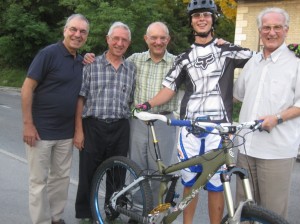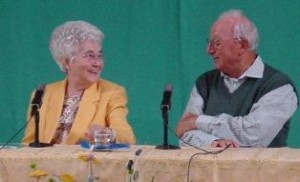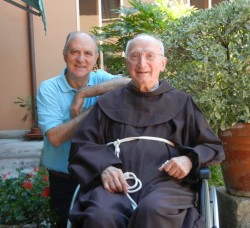Here I am, on retreat with some friends in Religious Life, all of whom have re-found the meaning of their Religious Lives through the experience of living the Spirit of Communion of the Church. Finding that meaning has come to us via the Focolare Movement. In essence, it is an experience of heaven on earth.
 |
Bro Real Savegeau (Marist brother, Canada), Brother Claude Passebon (Brother of St Gabriel France), Self (Benedictine England), Miha, a young Vincentian Lay helper (Slovenia), Germano Van de Meer (Divine Word Missionary, Brazil)
On 7 June 2012, at the Eucharistic Congress, in Dublin, Cardinal Ouellet gave a talk at a theological symposium, in which he stated: “The ecclesiology of communion is the central and fundamental idea of the Council’s documents.” This has been confirmed by documents of the Church ever since; it means, in practice, that we in the Church, ought to aim to be truly a family of people, each person with different functions. Each person is invited to make his, or hers, the New Commandment of Jesus: “To love each other as I have loved you” (John 13, 34-35). This ‘central plank’ of the new vision of things, has been the inspiration for the Church, and the humanity of the second Vatican Council, ever since.
The first male Religious who followed this path, and helped to set up a group of men in Religious Life who discovered this ‘treasure’, was a Franciscan called Fr. Andrea Balbo. Inevitably, he had an immense influence on my life, because I, too, found in this Spirit of Communion, the meaning of my Ampleforth Benedictine life. He became known as Fr. Novo (meaning new), because of that saying in the Gospel: “You must be born anew”. (John 3: 7), when he was first introduced to this ‘spirit’ in 1953, by Chiara Lubich.
 |
Fr. Novo with the founder of the Focolare, Chiara Lubich.
Fr. Novo was born in Vicenza, Italy, in 1923, and at the age of 13, went off to the minor seminary of the Friars Minor. He was in love with his studies, philosophy and the natural sciences, and all the new technology that had been developed during the 2nd World War. He studied theology in the Holy Land, and, after further studies in the Anatomy Institute, Naples, he continued for four more years studying chemistry, physics and astronomy, at the Sorbonne, Paris. He was the first Franciscan Friar since the French Revolution, to study in that famous university.
In the summer of 1953, he was invited to attend a meeting in the Dolomites. He agreed to go, because he thought he could study the geology of the mountains, and, to this end, he brought all his scientific instruments with him. Ultimately, he had no time for any studies, because that meeting was, in fact, one of the first Mariapolis, a summer appointment of the Focolare Movement. In regard to this, he explained: “Inside of me began the demolition of everything I had constructed, to give way gradually to a new vision of things. There a new kind of catalyst entered my life: God, Jesus in the midst of us. He began to create in me a new interior ordering, also a new mind set.”
I think that this new mind set, and this new vision of things, has created a new internal ordering in the lives of all those Religious that have learnt about this new spirit – a spirit which is fully in unison with the spirit of communion of Vatican 2. It is something that contains the Holy Spirit of God, as it brings so much hope, and life, to us in Religious Life and to the Church. It is this spirit that Fr. Andrea Balbo has led us to appreciate, alongside many other ‘foundation stones’ among Religious men. He was firm in his faith, in the power of this Spirit of Unity as a gift for the Church, and for the whole of humanity, even when he was an old and sick man in the last years.
Sadly, Fr. Novo died early in the morning of last Saturday, 28 July. It is probable that there will be many Religious, men and women, Priests and laity, at his funeral on Thursday 2nd August, possibly even Bishops and a Cardinal or two. The second of August is a prominent day for Franciscans; it is a feast of mercy, linked to the famous shrine in Assisi, the Porziuncula, where St. Francis died, and is one that brings mercy into peoples’ lives, by visiting a Franciscan church and praying there. Mercy is also an aspect of the modern vision of the Church since the Vatican Council.
His funeral will pass, largely unnoticed in the hurly burly of life, but then, Jesus’ death passed by unnoticed. However, he has made a huge difference to many peoples’ lives, including my own. I thank God for his life, and thank God for Fr. Novo’s continued support and protection, from his everlasting reward in heaven; more especially, because he was one of those instrumental in letting me have an experience of the kingdom of God on earth, and later, one day, I hope we can all enjoy the kingdom of God, in all its perfection, in heaven.
 |
Fr. Novo during his last illness with a friend Fr. Fabio Ciardi OMI
Readers of the blog are advised to go to the main blog site to view and read the blog in its original formatting.
